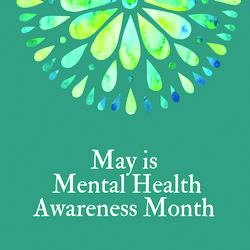Why be concerned about Native Americans’ mental health?
 May is National Mental Health Month. While mental health is rightfully a concern for all, Native Americans have multiple reasons to be committed to learning, acting, and advocating for increased awareness and access to culturally competent mental health care.
May is National Mental Health Month. While mental health is rightfully a concern for all, Native Americans have multiple reasons to be committed to learning, acting, and advocating for increased awareness and access to culturally competent mental health care.
According to an article published in 2023 by Compassion Behavioral Health, a top-rated mental health treatment and substance abuse center, “Native American communities have long faced numerous mental health struggles, many of which are rooted in historical processes that have contributed to social, economic, and cultural trauma. Through the centuries, colonization, forced assimilation, and other forms of persecution have had profound effects on the mental health of Native Americans, leading to mental health issues that continue to impact these communities today.
“One of the most significant contributors to mental health issues within Native American communities can be traced back to the impact of colonization. Beginning in the 15th century, Western European powers began to colonize and establish settlements in North America, leading to the systematic destruction of indigenous cultures and ways of life. These acts of aggression uprooted traditional belief systems and social structures, forcing Native Americans to adopt new ways of living that often conflicted with their own.
“This process ultimately led to intergenerational trauma, as newer generations of Native Americans inherited the pain and suffering of their ancestors who had endured the violent forces of colonization. The implications of this trauma manifested in a myriad of ways, such as the perpetuation of higher rates of poverty, low self-esteem, and poor health outcomes among Native Americans.
“The lasting effects of intergenerational trauma have lingered for centuries, leading to higher rates of mental illnesses like depression, anxiety, and post-traumatic stress disorder (PTSD) among Native Americans.”
According to the National Council for Behavioral Health, depression is actually twice as likely to occur among Native Americans when compared to the general population. Native Americans are twice as likely as any other ethnic group to suffer from substance abuse disorders, according to the National Institute on Drug Abuse. Native Americans have a rate of suicide that is 3.5 times higher than the overall rate of the US population, according to a report by the Centers for Disease Control and Prevention (CDC). According to a report by the National Association of Social Workers, a large proportion of Native American populations have experienced significant trauma, resulting in both physical and mental health disparities.
Individuals, community organizations, schools, business leaders and workplaces can become part of the solution to community mental health challenges with guidance from the 2024 Mental Health America (MHA) Mental Health Month Toolkit, which can be downloaded free of charge at mhanational.org/mental-health-month/2024-toolkit-download.
Founded in 1909, MHA is the nation’s leading national nonprofit dedicated to the promotion of mental health, well-being, and condition prevention. The theme for Mental Health Month 2024 is “Where to Start: Mental Health in a Changing World.” The goal is to help people start their mental health journey by understanding the impact of modern life on mental health and equip them with coping tools to navigate the challenges they face.
Whether the intention is to improve your own individual well-being, organize activities for the workplace, become an advocate for mental health, or put together resources for the community, MHA’s toolkit has something useful, including:
-Sample communications and talking points
-May is Mental Health Month proclamation
-Social media post language and shareable images
-Outreach ideas
-The “Be Seen in Green” challenge
-Resource directory
-Zoom backgrounds
-Posters
-Wellness tips calendar
-6 fact sheets
-Coloring pages
-Coping worksheets
-And more.
According to Schroeder Stribling, President and CEO of Mental Health America, “Every year, millions of Americans join (MHA) in promoting awareness, providing vital resources and education, and advocating for the mental health and well-being of all. In a world that is constantly evolving, it can be overwhelming to navigate the various challenges and changes happening around us. The pressures of work, relationships, and societal factors, like politics, climate change, and the economy, can significantly impact our mental well-being, sometimes even more than we realize.
“We (at MHA) aim to empower you to take action. There are numerous ways to do that, from building up your coping toolbox to advocating for improved mental health in your community.
“As we celebrate this Mental Health Month, let us embark on a journey together to prioritize our mental wellbeing in a changing world. Your actions, no matter how small, contribute to a collective effort in creating communities that value and support mental health.
If you have questions about Mental Health Month, contact: Danielle Fritze, MHA Vice President of Public Education and Design at dfritze@mhanational.org.”
(Contact Grace Terry at grace@angelsabide.com)
The post Why be concerned about Native Americans’ mental health? first appeared on Native Sun News Today.
Tags: More News
